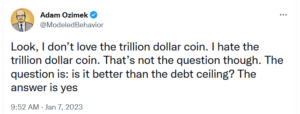From Garret Keizer‘s, One Resolution You Might Just Keep:
If resolution makers wanted a patron saint, they could do worse than Samuel Johnson (1709 to 1784), a lifelong resolver and by his own admission a lifelong failure at keeping his resolutions. Reading his diaries, we may sigh in recognition as time after time — at the New Year, at Easter and on his birthday — Johnson renews his intentions to rise early, to be more studious, to be more moderate in his intake of food and drink, and laments his neglect of those same intentions in the year past…
For Johnson, however, the critical question was not whether he’d accomplished great things but whether he’d accomplished them in proportion to his talents and his limited time. He was hyperconscious of mortality — on his watch was engraved “The night cometh, when no man can work” — and painfully frustrated by his seeming inability to keep the simplest promise to himself. Like almost everyone I know, he felt he should be accomplishing much more than he did…
It’s easy to miss the one resolution Johnson did keep, though to my knowledge he never wrote it down: the resolution to continue resolving. You can see that doggedness as an exercise in futility on Johnson’s part, but I prefer to see it as an act of charity toward himself. If Johnson is known for anything besides his literary accomplishments and his quotable remarks, it is his charity. He housed a motley assortment of needy dependents under his own roof. He pressed pennies into the hands of indigent children sleeping on the London streets. His almsgiving was so well known that he could scarcely leave his lodgings without being accosted by beggars. What was the point? A friend once asked him. “To enable them to beg on,” he said…
Johnson’s personal struggle is worth remembering not only as we form private resolutions to be better people but also as we ponder those collective resolutions repeatedly broken, and in some cases yet to be made, to confront such evils as environmental destruction and systemic racism…
Most of us know that heady sense of reprieve and possibility implicit in the mention of “another year.” I’ve made it this far. I’m not dead yet. I still have a chance — if only to take better care of those for whom “another year” means another term of misery. Johnson seems never to have lost sight of that chance. He saw it all around him, sleeping in the ashes, collapsed in the mire, and he seized it with compassion. How much happier this New Year would be if we resolved to do the same.

